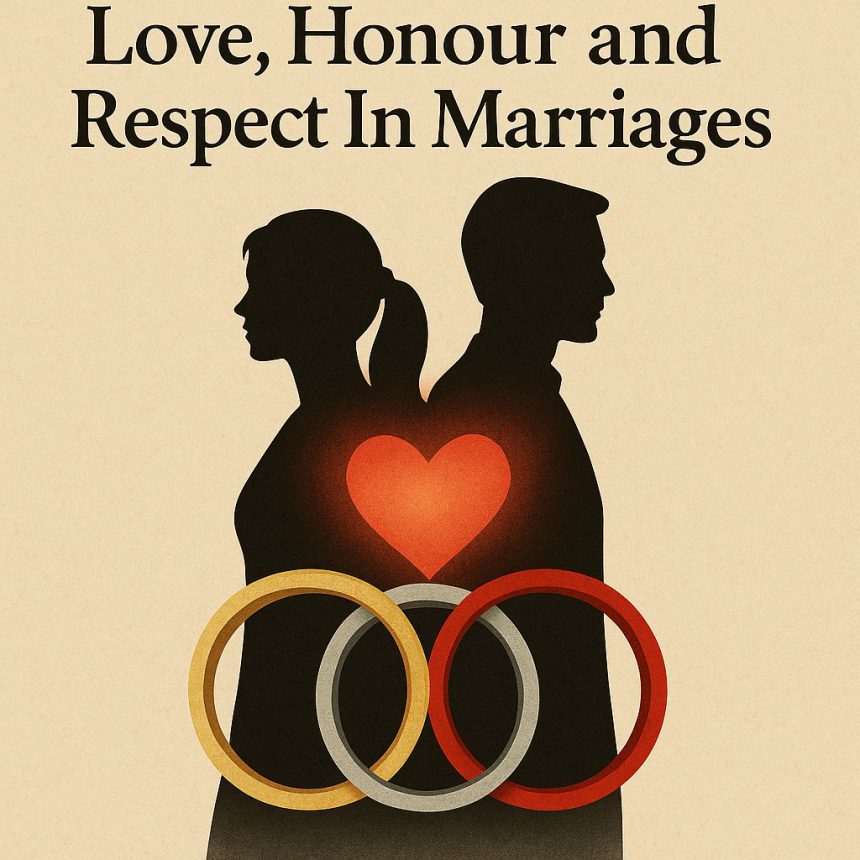Quite often, these roles or issues are either trivialized, played in reverse order or simply seen in a linear order.
I will take time to explain what I meant, but first, let me attempt to define each of these three concepts.
LOVE
This is the most often used word in marriages. It is a (deep?) appreciation or expression of innate affection and feelings for one another. It is the gateway or the opening word in attracting and accepting each other in a relationship.
Of course, it is both a feeling and an action word.
Debates abound on how it should be expressed. Some think it has to be verbalized all the time. Others view it as an action word that is better conveyed through our actions rather than our words. The latter anchored their argument on the popular saying that “action speaks louder than words”. They also justified their position by affirming that “talk is cheap,” but action is hardly mistaken.
While my intention is not to evaluate each position or take sides with any, it is just to set the tone properly that individual differences exist in the matter of what love is and how it should be expressed.
Scripturally speaking, there is a strong command about love, who should love and what format love should take.
Love is commanded to be sacrificial. The Bible asks the husband to love as Christ loves the Church. We do know that it predisposes the husbandman to love his woman, even if they are as ‘inconsistent’ as the Church would want to be through all ages. This is a serious assignment if you ask me. The demand is not that the wife should necessarily be ‘wife material’ before she can be loved.
Should love then be single-directional or multidirectional?
I know both parties always express love to each other.
If we view from the patience of Christ over the Church and the Yoruba ageless wisdom that it takes patience to be a husband to a woman, we may reason that the onus to love rests more on the husband than the wife.
HONOUR
Kindly permit me to say unambiguously that this again rests more squarely on the husbandman to honour the wife as part of the much vaunted protection he is expected to offer.
A man has the responsibility to shield his wife against all external aggression and abuse, including that from close relatives and third parties. The Bible enjoins us to honour them as a weaker vessel, and that the purposes of our prayers are not hindered.
There is a clear difference here between honour and respect.
Part of honouring her is not to respond to provocation outside the home or in the presence of other parties, including the children. Yes, this requires some level of understanding of both the psychological and physiological makeup of women, which may warrant some outbursts, even if they are not deliberately intended.
Honouring a wife fortunately brings honour back to the husband.
RESPECT
As I opined in an article elsewhere, respect is not slavery.
To respect a person is to accord some dignity to the person based on positions or some other factors that require some deference to the office or standing of the person. If we agree that husbandry is an exalted office, according to the occupant of that ‘office’, the deserved respect is not entirely out of order.
Should the husband always ask for respect, or should it be naturally given?
This ordinarily should not be a question. However, having heard it many times, the sarcastic response “Do you think that man deserves anything called respect?” I am inclined to seek people’s opinions on that.
Is there a man/husband who may not deserve respect?
From the analogy thus far, it seems that it is the responsibility of the husband to love and honour his wife, while the wife respects her husband.
Are these roles or functions linear?
What do I mean here?!
Can a wife love, honour, and respect her husband irrespective of his disposition towards her? Conversely, can the husband, regardless of the behaviour of the wife, love, honour, and respect his wife?
While these may appear unnecessary or too rhetorical, if we successfully unbundled them, they can enhance our knowledge and grant us more understanding needed to resolve some perennial conflicts that have become embedded in modern marriages, especially.
Should a woman say, “I feel dishonoured” instead of “I feel disrespected”?
Can a man not say, “I feel dishonoured”?
Can a wife love her husband, or is she constrained only to respect him?
I do not want to prolong this discourse so that I may round it off here.
In marriage, it would not hurt anyone, perhaps, if both parties can show elements of love, honour and respect to one another. While this may not mean we should ignore our core ‘responsibilities’, it may make for more harmonious living together.
Can’t love, humour and respect all be reciprocal?
I heard someone asking me, “When will you write about submission in marriages?”
Why not, if the inspiration comes from above?
Do you favour role reversal or role reciprocity?
Your thoughts and views are welcome.
©TheVillageBoy.
(The figure man who loves alphabets)










